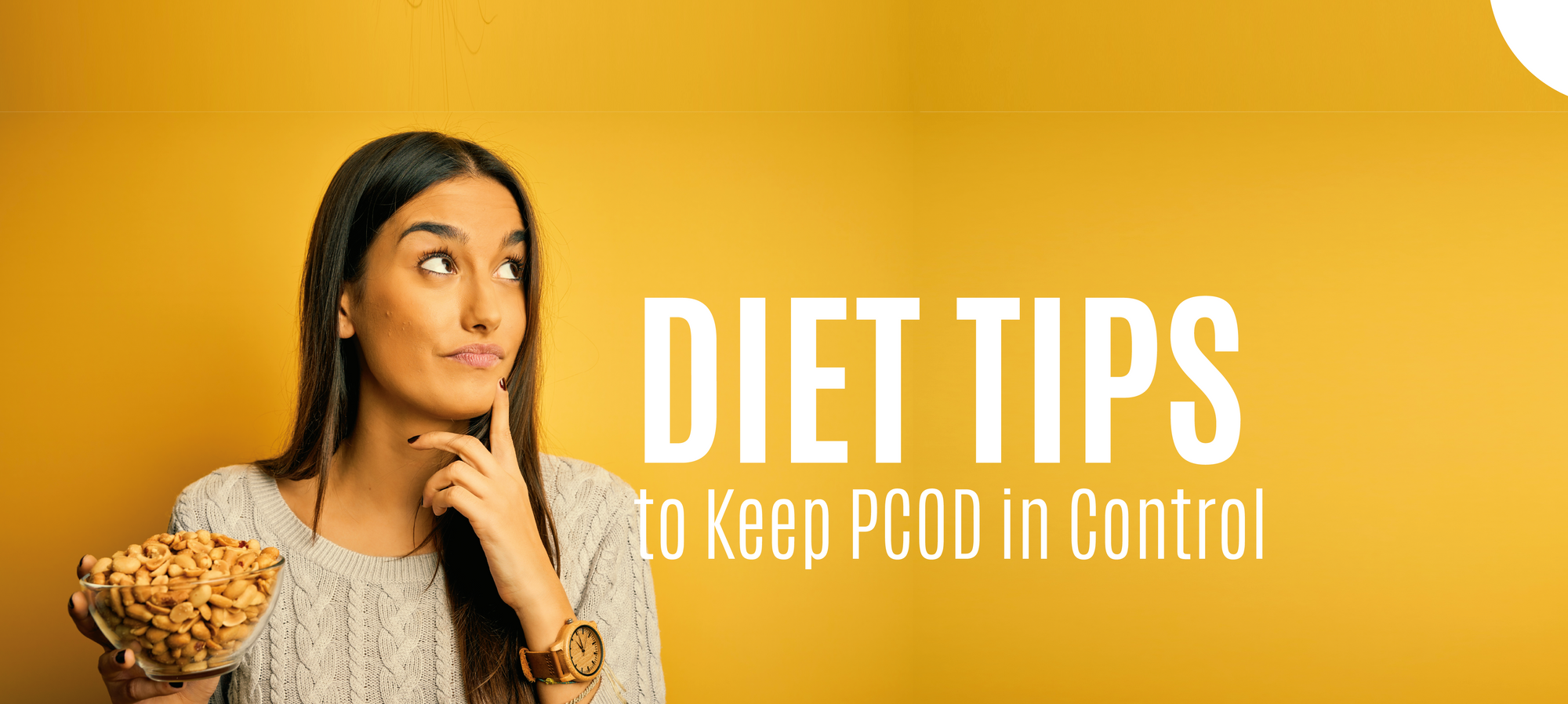Diet Tips to Keep PCOD in Control
These diet tips will help you keep your PCOD under control. Just highlighting how basic lifestyle changes take you a long way in managing chronic issues.

PCOD (Polycystic Ovarian Disease), commonly known as Polycystic Ovary Syndrome (PCOS), is a prevalent illness that affects 5% to 10% of women between the ages of 12 and 45. It's an issue caused by an imbalance in a woman's hormones.
Irregular periods, excessive bleeding during periods, hair growth, acne, weight gain, male pattern baldness, darkening of the skin, and headaches are the most prevalent PCOD/PCOS symptoms. Plus, these can have a detrimental impact on your mood.
PCOD is one of the leading reasons for female infertility. Around 80% of PCOD patients are obese, which increases the risk of metabolic syndrome, which increases the risk of heart disease, diabetes, and stroke. During the night, this disorder produces periodic pauses in breathing, which disrupts sleep. The majority of women with PCOD lack adequate knowledge about their condition and what they may do to control their symptoms. This leads their health to rapidly deteriorate, triggering a chain reaction of further ailments. If left untreated, PCOD can increase a woman's risk of developing endometrial cancer.
Diet and a healthy lifestyle are considered to play an important role in regulating PCOD.
Here’s how to can manage your PCOD:
1. INCLUDE ALL THE NUTRIENTS
Are you avoiding certain foods because you believe they would cause you to gain weight? We've been studying the importance of a well-balanced diet since we were children. To execute daily functions and duties, your body requires all macronutrients and micronutrients. By going on a crash diet or eliminating any food category, be it carbohydrates or fats, you are inviting inadequacies and diseases into your body. As a result, you must exercise restraint and strike a balance between healthy and favorite eating choices. You should not feel guilty after eating the meals you enjoy, as this creates a negative link with food.
2. SAY NO TO STARVATION AND SKIPPING MEALS
Do you know that starvation and skipping meals leads to weight gain in the long term? A big Yes, starvation leads to weight gain and increases the craving sensations as well. You have not given food to your growling and howling stomach at the right time. After some time, your stomach becomes greedy and you start having cravings. Now, you tend to choose less nutritious food choices and overeat them. Along with this, starvation leads to low energy and concentration levels. Practicing skipping will also adversely affect your mood and behavior.
3. SLEEP IS YOUR BEST FRIEND
Are you getting enough sleep, or are you getting up late to binge-watch your favorite show or finish your homework? Sleep is essential for your health, especially if you have PCOD. Sleep is extremely important for our hormone health and is an important component of PCOD management. Healthy sleep patterns can support mental health, immunological health, and blood sugar control, as well as make it simpler to eat a healthy, balanced diet. A good night's sleep is essential for women's physical and emotional health.
4. ENJOY EXERCISING
Physical activity must not be a torturing time for you and your body. It must be a fun and fit experience. Investing your 30 minutes every 5 days a week performing the exercise that you love, be it brisk walking, bhangra or aerobics is more beneficial than forcing your body to move.
5. TAKE CARE OF HYDRATION
Hydration plays a crucial role in your body’s response to PCOD. Drinking enough water is a vital element of sustaining a healthy diet and way of life. Plain water, Coconut water, Milk, Buttermilk, Lemonade, Soups and Broths, Fruits such as watermelon and muskmelon are excellent sources of hydration. Green tea is high in antioxidants and has been demonstrated to help women with PCOD improve insulin resistance and testosterone levels.
Finally, I'd want to emphasize that after you begin your PCOD diet, you should allow the adjustments time to take effect. Be gentle with your body and continue to make changes to your diet as you become more aware of how it affects you.
For more such insights, follow SocialBoat.
ABOUT THE AUTHOR
Ms. Rakshita Mehra is a Food and Nutrition Expert. She holds a degree in B.Sc. Home Science with specialization in Food and Nutrition from Lady Irwin College Delhi University. She is a Certified COVID-19 and Food Safety Supervisor by FSSAI. She has done an internship at Safdarjung Hospital, which is one the esteemed hospitals of Delhi. Currently, she is gaining experience at Max Super Speciality Hospital, Saket. She is the Founder and Director of a Health and Wellness company, Nutrishala. She is a master in conducting webinars and workshops. She is a Nutriwriter. Her work has been published in esteemed newspapers such as Hindustan Times, Dainik Savera Times. She has also contributed to a lot of magazines such as Travel Chapes magazine, Aces Magazine. One of her poems has been published in a book named Panacea. Her mission is to lead our country to a Healthy Nation!
